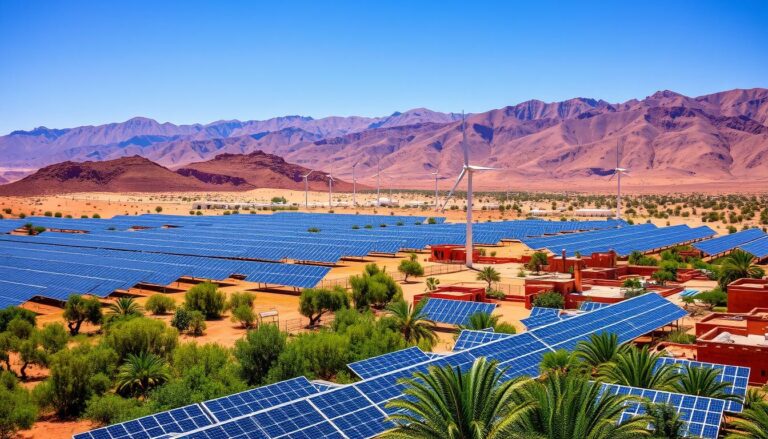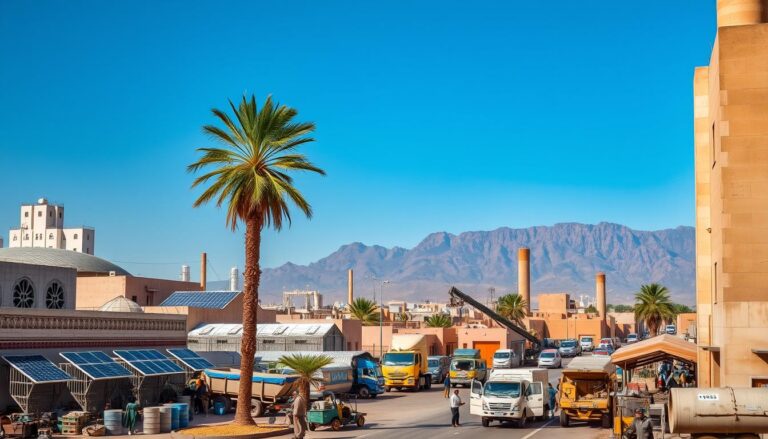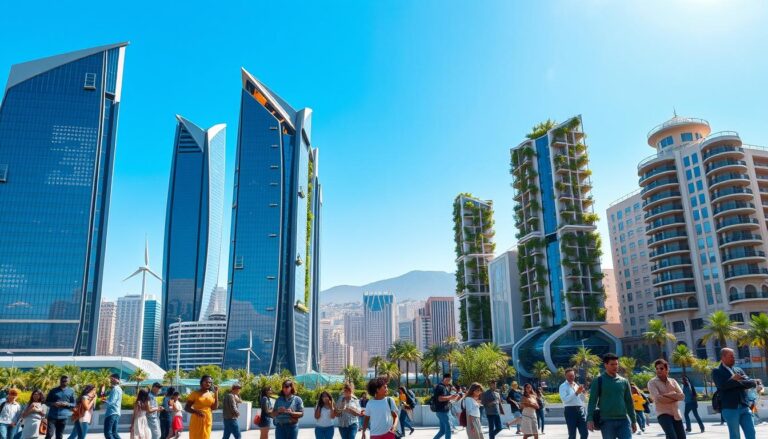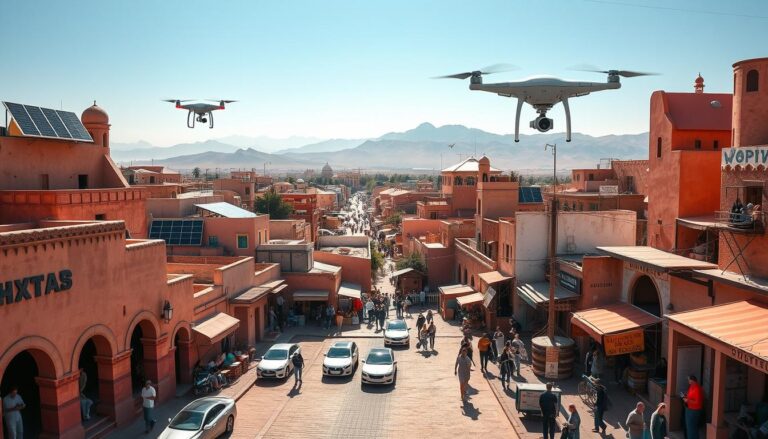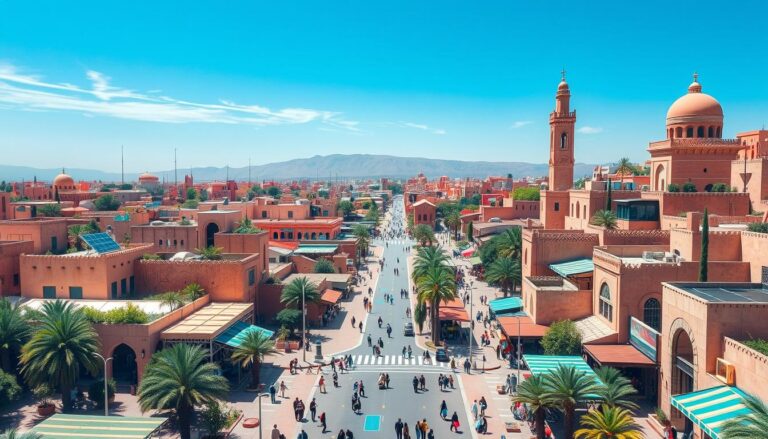Imagine a land where the golden hues of wheat fields stretch as far as the eye can see, where fertile valleys are adorned with olive groves and vineyards, and where the air is filled with the sweet scent of citrus blossoms. This is Morocco, a country whose agricultural heritage dates back centuries and continues to shape its present and future.
Agriculture in Morocco is not just about sustenance; it is a way of life, deeply rooted in tradition and intertwined with the nation’s identity.
Yet, behind this picturesque image lies a complex web of challenges that threaten to unravel this delicate balance. Climate change, water scarcity, soil erosion, and rural poverty are just some of the pressing issues facing Moroccan farmers today.
As global food demand continues to rise and resources become increasingly scarce, finding sustainable solutions for agriculture in Morocco has never been more crucial. It is not only about securing food security for its people but also ensuring the prosperity of its farmers and protecting the environment for future generations.
In this article, we will delve into the importance of agriculture in Morocco, explore the challenges it faces, and discuss innovative solutions that aim to cultivate a sustainable future.
From modern irrigation techniques to organic farming practices, from empowering small-scale farmers to promoting agroecology – we will uncover how Morocco is rising up to meet these challenges head-on.
Join us on this journey through Morocco’s agricultural landscape as we discover how cultivating a sustainable future holds promise not only for this vibrant nation but also for our planet as a whole.
Key Takeaways
- Climate change, water scarcity, soil erosion, and rural poverty are pressing issues facing Moroccan farmers.
- Collaboration between government bodies, research institutions, NGOs, and farmers is necessary to find solutions for Moroccan agriculture.
- Promoting water conservation methods like drip irrigation and agroforestry practices can help withstand climate change impacts.
- Implementing innovative farming techniques, such as precision agriculture and vertical farming, can optimize resources and lead to long-term success.
The Importance of Agriculture in Morocco
You might not realize it, but agriculture plays a vital role in Morocco’s economy and is crucial for sustaining the country’s future development.
The importance and impact of agriculture in Morocco cannot be overstated. Not only does it contribute significantly to the country’s GDP, but it also provides employment opportunities for a large portion of the population. In fact, agriculture employs around 40% of Morocco’s workforce.
The economic growth that stems from agriculture is an essential factor in Morocco’s overall development. The sector contributes around 15% to the country’s GDP, making it one of the main drivers of economic activity. It not only ensures food security for the population but also generates substantial exports of agricultural products such as citrus fruits, vegetables, and olive oil. These exports contribute significantly to foreign exchange earnings and help balance trade deficits.
Furthermore, agriculture plays a crucial role in addressing unemployment in Morocco. With limited job opportunities outside urban areas, many individuals rely on agricultural activities for their livelihoods. Farming provides employment opportunities for both skilled and unskilled workers across various stages of production – from planting and harvesting to processing and marketing.
Transitioning into the subsequent section about challenges facing Moroccan agriculture, it is important to acknowledge that despite its significance, this sector faces numerous challenges that threaten its sustainability.
Challenges Facing Moroccan Agriculture
Facing a steep uphill battle, Moroccan farmers are confronted with numerous obstacles as they strive to harvest a flourishing and thriving crop. The challenges facing Moroccan agriculture are multifaceted and require innovative solutions to ensure the sustainability of this vital industry. One major challenge is the impact of climate change on agricultural practices. Erratic weather patterns, including prolonged droughts and unpredictable rainfall, have disrupted traditional farming techniques and led to reduced yields. This has forced farmers to adapt their methods and seek alternative approaches to protect their livelihoods.
Another obstacle that Moroccan agriculture faces is the need for modernization efforts. While some parts of the country have embraced technological advancements in farming, many rural areas still rely on outdated practices. Limited access to resources such as machinery, irrigation systems, and fertilizers hinders productivity and efficiency. Additionally, inadequate training and education on modern agricultural techniques limit the ability of farmers to improve their practices. To overcome these challenges, there must be a concerted effort to provide farmers with the necessary tools and knowledge to embrace sustainable farming methods.
To paint a clearer picture of the challenges facing Moroccan agriculture, consider the following table:
| Challenges | Impacts |
|---|---|
| Climate Change | Erratic weather patterns disrupt farming |
| Modernization Efforts | Limited access to resources hindering productivity |
Addressing these issues requires collaboration between government bodies, research institutions, NGOs, and farmers themselves. Solutions should focus on adapting farming techniques to withstand climate change impacts by promoting water conservation methods such as drip irrigation or implementing agroforestry practices that provide natural shade for crops. Furthermore, investing in infrastructure development can improve accessibility for rural communities while also providing opportunities for mechanization.
Moroccan agriculture faces significant challenges due to climate change impacts and limited modernization efforts. However difficult these obstacles may seem, innovative solutions can pave the way towards sustainable agriculture in Morocco. By recognizing these challenges head-on and implementing effective strategies, Moroccan farmers can cultivate a prosperous and resilient future for themselves and the nation. Transitioning to the subsequent section about solutions for sustainable agriculture in Morocco, it is crucial to explore the steps that can be taken to overcome these challenges and ensure a brighter future for agricultural practices in the country.
Solutions for Sustainable Agriculture in Morocco
In order to cultivate a sustainable future for Moroccan agriculture, there are several key solutions that can be implemented.
First, efficient use of water resources is crucial in a region where water scarcity is an ongoing challenge. By implementing innovative farming techniques such as drip irrigation and precision agriculture, farmers can maximize the productivity of their crops while minimizing water usage.
Additionally, promoting the cultivation of water-saving crops such as drought-tolerant varieties can help alleviate the pressure on limited water resources.
Efficient use of water resources
Using innovative irrigation techniques, Moroccan farmers are able to make every drop of water count in their quest for sustainable agriculture. Water conservation is a top priority, and farmers have implemented various irrigation methods to optimize water usage. Here are three key ways they achieve efficient use of water resources:
-
Drip irrigation: By delivering water directly to the roots of plants, drip irrigation minimizes wastage and ensures that every plant receives the necessary amount of water. This method reduces evaporation and allows for precise control over irrigation levels.
-
Sprinkler systems: Moroccan farmers utilize sprinkler systems that distribute water evenly across fields, mimicking rainfall patterns. These systems help prevent overwatering while ensuring that crops receive adequate hydration.
-
Rainwater harvesting: To maximize the use of natural resources, Moroccan farmers collect rainwater through reservoirs or catchment areas. This stored rainwater can then be used during dry periods when access to freshwater may be limited.
By implementing these innovative irrigation techniques, Moroccan farmers not only conserve water but also ensure its efficient utilization for sustainable agriculture practices. Transitioning into the subsequent section about the implementation of innovative farming techniques, it’s essential to explore other aspects such as soil management and crop diversification in order to achieve a comprehensive approach towards sustainable agriculture in Morocco.
Implementation of innovative farming techniques
To truly revolutionize your farming practices, consider adopting innovative techniques that will not only optimize your resources but also lead to long-term success.
One such technique is precision agriculture, which utilizes advanced technologies like GPS and remote sensing to monitor and manage crop growth. By collecting data on soil moisture levels, nutrient content, and pest infestations, precision agriculture allows farmers to make more informed decisions regarding irrigation, fertilization, and pesticide application. This targeted approach ensures that resources are used efficiently while minimizing environmental impact.
Another innovative technique gaining popularity is vertical farming. This method involves growing crops in vertically stacked layers or structures using hydroponics or aeroponics systems. Vertical farming maximizes land use by utilizing vertical space instead of traditional horizontal fields. It also reduces water consumption as crops are grown in a controlled environment with precise amounts of water delivered directly to the roots. Additionally, this technique minimizes the need for pesticides and herbicides since pests are less likely to infest indoor farms.
By implementing these innovative farming techniques – precision agriculture and vertical farming – you can significantly enhance your agricultural practices. These methods not only optimize resource utilization but also contribute towards sustainability by reducing water consumption and minimizing environmental harm caused by pesticides.
Now let’s delve into the next section about the promotion of water-saving crops without compromising yield or quality.
Promotion of water-saving crops
Imagine how your farm could thrive and flourish by embracing the concept of water-saving crops, all while maintaining high yields and exceptional quality. By implementing water-saving techniques in your agricultural practices, you can significantly reduce water usage without compromising on crop productivity.
This not only helps to conserve precious water resources but also contributes to sustainable farming practices.
To adopt this approach, consider diversifying your crop selection to include varieties that are known for their ability to thrive with minimal water requirements. Some examples of such crops include drought-tolerant grains like millet and sorghum, as well as legumes like chickpeas and lentils. These crops have adapted to arid conditions over time and have developed mechanisms to maximize water utilization efficiency.
Additionally, incorporating precision irrigation methods such as drip or micro-sprinkler systems can further minimize water wastage by delivering water directly to the roots of plants.
By promoting the cultivation of these water-saving crops and utilizing efficient irrigation techniques, you can contribute towards a more sustainable future for agriculture in Morocco. This will not only ensure the long-term availability of essential resources like fresh water but also help farmers achieve food security and prosperity.
Achieving Food Security and Farmers’ Prosperity
To achieve food security and farmers’ prosperity in Morocco, it’s crucial to ensure access to nutritious food for all.
This can be achieved through implementing sustainable agricultural practices that prioritize the production of diverse and healthy crops.
Additionally, increasing farmers’ incomes can be accomplished by promoting sustainable practices that enhance productivity, reduce costs, and improve market access for small-scale farmers.
Ensuring access to nutritious food for all
With a focus on cultivating a sustainable future, Morocco is taking active steps to ensure that nutritious food is accessible to all. The government has implemented various initiatives and policies aimed at improving access to nutritious food and promoting food security in the country.
-
Enhancing agricultural productivity: Morocco has been investing in modernizing its agricultural sector, focusing on increasing crop yields and improving farming techniques. This includes providing farmers with better access to quality seeds, fertilizers, and irrigation systems. By enhancing productivity, the country aims to increase the availability of nutritious food for its population.
-
Promoting sustainable farming practices: Morocco recognizes the importance of sustainable agriculture in ensuring long-term access to healthy food. The government has been encouraging farmers to adopt environmentally-friendly practices such as organic farming, agroforestry, and water management techniques that conserve resources while maintaining soil fertility. These practices not only contribute to healthier food production but also help preserve the environment.
-
Strengthening local food systems: In order to improve access to nutritious food for all citizens, Morocco is working towards strengthening its local food systems. This involves supporting small-scale farmers and promoting local markets where fresh produce can be easily accessed by consumers. By reducing reliance on imported goods and promoting local production, the country aims to enhance food security and provide affordable options for nutritious meals.
-
Investing in nutrition education: Alongside efforts aimed at improving physical access to nutritious food, Morocco recognizes the importance of educating its population about proper nutrition. The government has been investing in nutrition education programs that aim to raise awareness about healthy eating habits and promote balanced diets among individuals of all ages.
By ensuring access to nutritious food for all through these initiatives, Morocco isn’t just addressing immediate concerns related to hunger but also laying the foundation for a prosperous future where individuals can lead healthy lives. Transitioning into the subsequent section about ‘increasing farmers’ incomes through sustainable practices,’ this holistic approach towards agriculture will further contribute to achieving both sustainability and prosperity in the sector.
Increasing farmers’ incomes through sustainable practices
You can boost your income as a farmer by adopting sustainable practices that not only benefit the environment but also contribute to long-term prosperity. By increasing productivity and diversifying your market, you can create new opportunities for growth and financial stability.
Increasing productivity is essential for maximizing your income as a farmer. By implementing sustainable agricultural techniques such as crop rotation, organic fertilizers, and efficient irrigation systems, you can optimize the use of resources and improve yields. Additionally, investing in modern machinery and technology can help streamline farming operations, saving time and reducing costs. These practices not only increase profitability but also ensure a more efficient use of land and resources, contributing to the overall sustainability of agriculture.
Market diversification is another strategy that can enhance farmers’ incomes sustainably. Relying on a single crop or market leaves farmers vulnerable to price fluctuations and market risks. Diversifying your crops or exploring niche markets allows you to tap into different consumer demands and reduce dependence on a single commodity. This approach opens up new revenue streams while mitigating potential losses from unpredictable market conditions.
Incorporating these sustainable practices into your farming operations increases productivity and opens up new market opportunities, ultimately boosting your income as a farmer. Transitioning into the subsequent section about ‘protecting the environment for future generations,’ it is crucial to recognize that adopting sustainable practices not only benefits current farmers but also ensures the preservation of natural resources for future generations.
Protecting the Environment for Future Generations
By implementing sustainable farming practices, future generations can ensure the preservation of Morocco’s environment.
Environmental conservation is crucial for the long-term sustainability of agriculture in Morocco. Sustainable farming practices prioritize the protection and preservation of natural resources, such as soil, water, and biodiversity. These practices aim to minimize negative impacts on the environment while maximizing production efficiency and farmers’ incomes.
To achieve this, farmers can adopt several strategies:
-
Crop rotation: By rotating crops regularly, farmers can reduce soil erosion, improve nutrient cycling, and control pests naturally. This practice helps maintain soil fertility over time and minimizes the need for synthetic fertilizers and pesticides.
-
Water management: Efficient irrigation techniques such as drip irrigation or precision sprinklers can significantly reduce water waste in agriculture. By using water more efficiently in their fields, farmers contribute to conserving water resources for future generations.
-
Conservation tillage: Traditional tillage practices involve plowing or turning over the soil before planting crops. However, conservation tillage techniques minimize soil disturbance by leaving crop residues on the field or using minimum tillage methods. This approach helps prevent erosion and loss of organic matter from the soil.
Implementing these sustainable farming practices not only protects the environment but also benefits future generations by ensuring that natural resources will be available for years to come. It minimizes pollution from agrochemicals that could contaminate water sources, preserves biodiversity by maintaining habitats for wildlife, and contributes to climate change mitigation through reduced greenhouse gas emissions.
Environmental conservation is a critical aspect of cultivating a sustainable future in Moroccan agriculture. By adopting sustainable farming practices like crop rotation, efficient water management, and conservation tillage techniques, we can protect Morocco’s environment for future generations while ensuring agricultural productivity and economic prosperity go hand-in-hand with environmental stewardship.
Through these efforts today, we pave the way for a greener tomorrow where both people and nature thrive harmoniously.
Conclusion
In conclusion, agriculture in Morocco holds the key to a sustainable future. With its rich history and vast landscapes, this country has nurtured crops and livestock for centuries. However, it’s not without its challenges.
The Moroccan farmers are facing obstacles such as climate change, water scarcity, and limited access to resources. These challenges demand innovative solutions that prioritize sustainability. By employing modern techniques like drip irrigation and precision farming, farmers can maximize their yields while minimizing the use of precious resources.
Furthermore, embracing organic farming practices can help preserve the environment and protect the health of consumers.
As you envision Morocco’s agricultural landscape of the future, picture thriving farms with lush green fields stretching as far as the eye can see. Imagine farmers harvesting bountiful crops using state-of-the-art technology that optimizes productivity while reducing environmental impact. Visualize markets overflowing with fresh fruits and vegetables grown locally by passionate individuals who are proud stewards of their land.
By investing in sustainable agriculture, Morocco can achieve food security for its population and ensure prosperity for its farmers. This will not only contribute to economic growth but also foster a sense of pride in Moroccan agriculture on both national and international levels.
Let’s work together towards cultivating a sustainable future where generations to come can reap the benefits of a thriving agricultural sector while preserving our natural resources for years to come.

The Editorial Team is a passionate group of Morocco enthusiasts dedicated to sharing the beauty, culture, and wonders of this captivating country. With diverse backgrounds and a deep love for travel, we strive to bring you engaging and informative content that inspires your Moroccan adventures. From uncovering hidden gems and sharing local insights to exploring mouthwatering cuisine and showcasing the vibrant lifestyle, our team is committed to providing you with valuable resources and exciting stories that enhance your exploration of Morocco. Join us on this journey as we celebrate the rich heritage and unforgettable experiences that make Morocco truly special.

